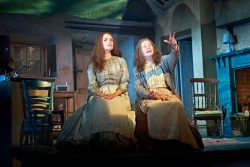 HOW do you set about reviewing a play? That’s a question that lots of people ask, and the answer is complicated. For anyone who has been doing it as long as I have, it is a combination of experience, knowledge of the work, previous productions and performances, the effect THIS production has on THIS audience – but mainly it is how it tells the story and the effect that it has on you, the reviewer.
HOW do you set about reviewing a play? That’s a question that lots of people ask, and the answer is complicated. For anyone who has been doing it as long as I have, it is a combination of experience, knowledge of the work, previous productions and performances, the effect THIS production has on THIS audience – but mainly it is how it tells the story and the effect that it has on you, the reviewer.
Current thinking maintains, perhaps correctly, that everyone has a right to their opinion and so an equal right to believe that that opinion should be heard, however it might have been formed … the rise of the “citizen journalist”. What I think you must do is to give every play, every performance, a fair amount of time and thought. That can be difficult if you (a) know the play backwards, (b) feel at the outset that it’s a lightweight piece of puffery for a TV celebrity, or maybe (c) just don’t like it, perhaps because it has absolutely no likeable or sympathetic characters and the story bores you.
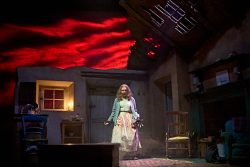 The Croft, the play whose second run after a COVID truncation has opened at Salisbury Playhouse, is none of those things. Debut playwright Ali Milles has tried to weave in so many themes and ideas that most of the packed audience on the night I went left the theatre asking “What was all that about?”
The Croft, the play whose second run after a COVID truncation has opened at Salisbury Playhouse, is none of those things. Debut playwright Ali Milles has tried to weave in so many themes and ideas that most of the packed audience on the night I went left the theatre asking “What was all that about?”
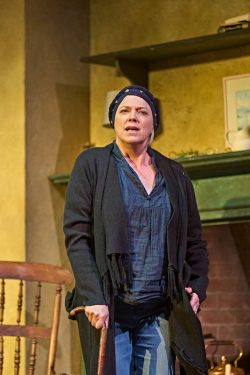 On paper, and billed as a thriller, it looks promising. It has two favourite TV stars (Liza Goddard and Caroline Harker) and a story rich in folklore, set in a remote Scottish croft which is haunted by the ghosts of its previous inhabitants.
On paper, and billed as a thriller, it looks promising. It has two favourite TV stars (Liza Goddard and Caroline Harker) and a story rich in folklore, set in a remote Scottish croft which is haunted by the ghosts of its previous inhabitants.
It is about 16 hours since I left the theatre, and since then, including in waking hours overnight, I have been asking myself what were the intentions of the writer and the director. We can with some certainty say that the Selkies are among the ingredients, and acquaintance with Joan Baez’s unforgettable song and some of the other versions of the various legends mean that I have some idea of that element.
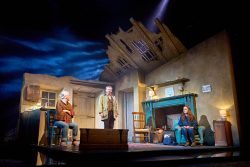 One reviewer of the 2020 original production likened Milles’s writing to that of Connor McPherson, particularly in The Weir. Well, that might have been what Ali was aiming for, but it’s rather more as though The Croft is attempting to follow a recipe with a list of ingredients as long as your arm – and then some. One of the mysteries is that there is absolutely NOTHING about Ali Milles in either the programme or on line … NOTHING. As far as I can make out it is not an anagram (apart from I’m ill seal]. Ali, as we know, might usually be a male, or a female, name.
One reviewer of the 2020 original production likened Milles’s writing to that of Connor McPherson, particularly in The Weir. Well, that might have been what Ali was aiming for, but it’s rather more as though The Croft is attempting to follow a recipe with a list of ingredients as long as your arm – and then some. One of the mysteries is that there is absolutely NOTHING about Ali Milles in either the programme or on line … NOTHING. As far as I can make out it is not an anagram (apart from I’m ill seal]. Ali, as we know, might usually be a male, or a female, name.
There is a very strong lesbian theme running through both the modern day and historic limbs of the story, as well as a feminist dynamic – men are duplicitous, selfish, dominating and weak, it seems to say. BUT then, we have central character Laura falling for a woman who is just like her dead mother – underlining a traditional and now much despised view of one of the “reasons” for homosexuality.
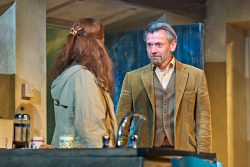 We have cheap laughs about mistaking the word Selkie for Selfie. And really laughable moments when poor Laura pours coffee as though she has never seen a cafetiere before, and her father totes a sack of logs as though they are feathers.
We have cheap laughs about mistaking the word Selkie for Selfie. And really laughable moments when poor Laura pours coffee as though she has never seen a cafetiere before, and her father totes a sack of logs as though they are feathers.
I think there probably is a good play in here somewhere, but until either the writer, whoever he or she may be, and the director Alastair Whatley, decide what is the main emphasis, and allow the other elements to take a secondary role, audiences will continue to wade through the confusion, however powerful the performances of Gracie Followes (as Laura and the poignant Eileen), Gray O’Brien and Simon Roberts, and the excellent Harker and Goddard.
GP-W
Photographs by Manuel Harlan